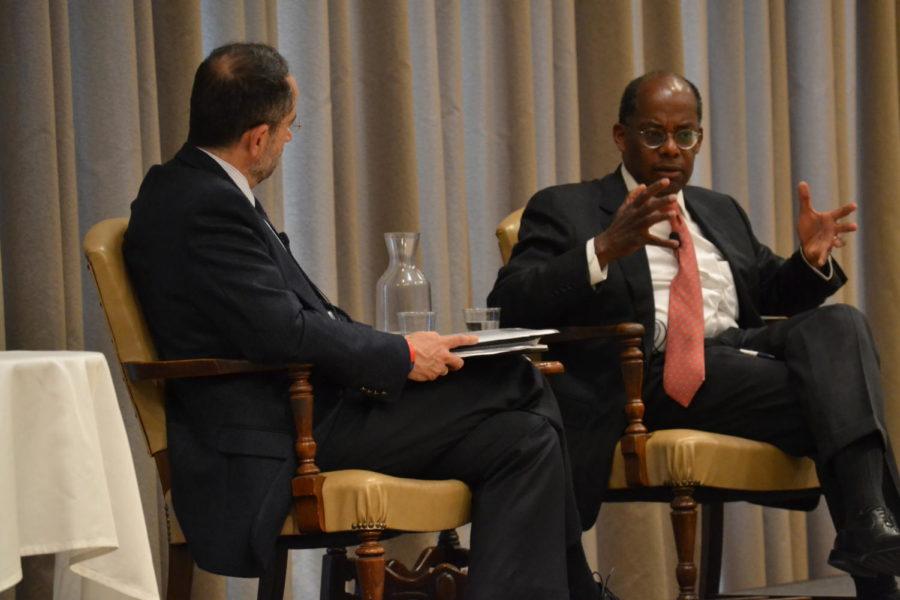CEO of Fortune 100 company speaks of diversity, inclusion in business
TIAA President and CEO Roger Ferguson, answers questions about becoming the first African-American vice chairmen of the U.S. Federal Reserve in the Sun Room April 11.
April 11, 2017
Roger Ferguson, one of the few African-American CEOs of a Fortune 100 company (TIAA), grew up in Washington, D.C., in the time of the civil rights movement and the Vietnam War.
His mother was a school teacher who instilled in him early on that “education is the one thing that no one can take away from you.”
His father was a child of the Great Depression. He had an avid fascination with banks and investments, something that would lead Ferguson to his own interest and success within economics.
“Most dads, growing up, would be talking about box scores and the latest football game,” Ferguson said. “My father was interested in that, but our dining room conversation was often around interest rates on CDs and should he take his thousand dollars from this bank and move it to that bank.”
On Friday evenings, his family would gather around a small television set and watch “Wall Street Week” with Louis Rukeyser.
“Could you imagine, this little black family with no finances to speak of, and we were gathered around this thing eating popcorn as though we were millionaires looking for the best investment advice,” Ferguson said.
Through his parents and the generation he was born within, Ferguson became the man he is today, a self-proclaimed “child of the Brown v. Board of Education decision.”
As he was growing up, Ferguson was first enrolled in segregated schooling. Some of the stores required African-American people to enter through the back door, while white people got to go through the front. The famous amusement park nearby, owned by the state of Maryland and therefore public property, was segregated as well.
“Blacks weren’t allowed,” Ferguson said. “In fact, they closed the amusement park instead of integrating it.”
Up until sixth grade, Ferguson said he didn’t know anyone who wasn’t African-American. In seventh grade, for the first time, he went to a school that was integrated.
“There were white kids, and Asian kids, as well as African-American kids and a few — not many — Latinos or Hispanic students as well,” Ferguson said. “I realized … here I was, this little black kid from the low and moderate income part of Washington, D.C., holding my own.”
Ferguson found that, lo and behold, he could swim rather than sink within the academic crowd.
This would hold true when he went to Harvard University for all three of his degrees. First, a bachelor’s degree in economics in 1973. Second, his law degree in 1979. And third, his doctorate in 1981.
“I had a work-study job cleaning bathrooms for my first two years,” Ferguson said. “For some people, that was embarrassing. For me, I was really proud to do it.”
It was here that Ferguson found empathy that he would later use within his business.
“One of my roommates had a job washing dishes,” Ferguson said. “I recognized that the folks who are not so visible on campus, the janitorial staff, the buildings and ground staff, the food service staff, are equally important to the success of the institution.”
Ferguson discovered within Harvard University that those doing the day-to-day labor were just as vital to the foundation of the institution as the Nobel prize-winning faculty.
“And a well-functioning unit needs both,” Ferguson said. “I learned that by being part of both parts of the world.”
Part of being a well-functioning unit, Ferguson said, is holding the importance of diversity and inclusion within business.
“Diverse teams, with different points of view, end up making the better decisions,” Ferguson said. “And we really believe that in our organization, and it shows up in the way we talk about who we are.”
Ferguson used one of TIAA’s commercials as an example. In the commercial, an African-American woman was a professor, a Hispanic woman worked within a hospital dreaming about an education for her daughter and a white male was a custodian.
“That’s who we are,” Ferguson said. “We have chosen to be that because, one, we think it makes good business sense, and two, it’s also morally right.”
Being the CEO of a company that is managing around $907 billion, it isn’t difficult to imagine that one could become pompous, yet Ferguson doesn’t let the success strike his ego.
“Every day, I am surrounded by nearly 13,000 people who are working really hard to figure out the best answers here,” Ferguson said. “So this is not about me. This is about this team of 13,000 people that it takes to do this well.”







